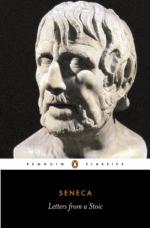
|
| Name: _________________________ | Period: ___________________ |
This test consists of 15 multiple choice questions and 5 short answer questions.
Multiple Choice Questions
1. What affects Seneca's exercise time according to Letter LXXXIII?
(a) His lack of time.
(b) The amount of time he studies.
(c) His old age.
(d) His lack of interest.
2. What does Seneca consider to be the gift of gods?
(a) Only life.
(b) Nothing.
(c) Only philosophy.
(d) Both life and philosophy.
3. Who wrote the Aeneid?
(a) Homer.
(b) Virgil.
(c) Petronius.
(d) Seneca.
4. What becomes of people who live a quiet, private life which incites neither anger nor envy?
(a) They are stoned.
(b) They are bored.
(c) They accomplish nothing.
(d) They remain safe.
5. According to his criticism in Letter CVIII, what does Seneca say literary scholars should do with philosophical theories?
(a) Interpret them correctly.
(b) Write fiction about them that will appeal to the masses.
(c) Apply them to their own lives.
(d) Compare them to other theories.
6. Why does Seneca say he decided not to commit suicide?
(a) For his father's sake.
(b) He snapped out of his depression.
(c) He was too afraid.
(d) He fell in love with a woman.
7. What is symptomatic of excessive attachment to the body, according to Seneca?
(a) Frequent trips to community baths.
(b) Excessive concern with pain.
(c) Frequent baths.
(d) Excessive primping.
8. According to Seneca, what is death?
(a) Nothing but an unconscious state of non-existence.
(b) The gateway to Heaven and an opportunity to meet the gods.
(c) A doorway into a wonderful after life.
(d) An unconscious state of non-existence or a better state than life.
9. Who does Seneca point out (in Letter CIV) had a wife and children who constantly nagged him?
(a) Sophocles.
(b) Socrates.
(c) Himself.
(d) Plato.
10. According to his criticism in Letter CVIII, what does Seneca say literary scholars do with philosophical theories?
(a) Read them over and over.
(b) Help spread them to the masses.
(c) Ruin them by writing them down incorrectly.
(d) Dissect the words without garnering the meaning.
11. According to Seneca, where are the sharpest pains?
(a) In the heart.
(b) In the nose.
(c) In the smallest area of the body.
(d) In the eye/temple area because they are close to the brain.
12. According to Letter LXV, how do friends get Seneca to stop reading and writing while he is sick?
(a) By entertaining him with a short play.
(b) By taking him to a hospital.
(c) By bringing in a card game.
(d) By asking him to discuss a philosophical question.
13. How does Seneca spend most of his day?
(a) In study.
(b) Dreaming.
(c) Praying.
(d) Exercising.
14. When does Seneca say that men that began to claim pieces of land as their property?
(a) When greed entered the hearts of mankind.
(b) When the emperor began giving it away.
(c) When gods told them to do so.
(d) When they became more self-aware.
15. What does Scipio volunteer to do?
(a) Go into exile.
(b) Care for the ailing Seneca.
(c) Kill Seneca.
(d) Help teach Seneca.
Short Answer Questions
1. According to Seneca, what often brings the most unusual tragedies?
2. How can a person be prepared for any tragedy that might happen?
3. What does Seneca called the past age?
4. What do the friends Seneca talks about in Letter LXV compare to concepts by Aristotle and Plato?
5. Why does Seneca praise suicide?
|
This section contains 576 words (approx. 2 pages at 300 words per page) |

|




